
The Animal Cruelty Awareness Project
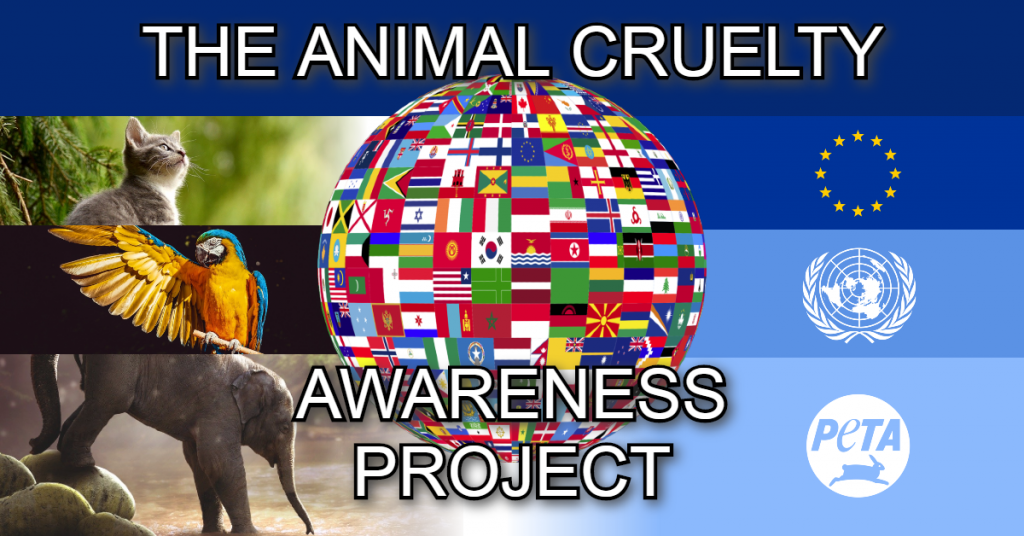
Animals around the world need our help.
Dogs, cats, bears, elephants, marine wildlife. The tiniest creatures to the world’s giants.
The problem seems insurmountable.
As an animal lover, what can you do? Signing a petition, adopting a rescue animal, donating money to an animal sanctuary: these efforts can seem tiny when compared to the sheer vastness of the issue.
Sure, by rescuing a dog rather than buying a puppy, you’ve saved one adult dog from being killed in an overgrown shelter. You’ve given her a cozy, warm, protected home to live out her final years. You’ve shown her love and peace and safety after a life of cruelty and neglect.
But what about the billions of other animals in the world that need your help too?
You are just one person, and you can only do what you can do. At first, this sentiment may feel disempowering, but its intent is quite the opposite. You are one person, and you have done as much as you can do with what you have. If everyone in the world followed in your footsteps, global animal cruelty issues would no longer exist.
That’s why we put together this information. We aimed to spread awareness of global animal rights issues, to shine a light on the plights of some of the world’s most vulnerable and abused inhabitants. For those who were unaware of the true extent of animal abuse around the world, we aimed to put this issue in sharp focus. For those who were well aware of the problems faced by animals of every size and in every country, we aimed to provide easy ways for you to help and support the organizations that share the same values as you do.
This page is the result of months of in-depth research into numerous publications. We compiled as much data as we could find, from local animal rights issues in various countries and continents of the world to issues that affect animals globally. We are continually working on visualizing this data to represent the types of animal abuse issues that are prevalent in various parts of the world. (We hope to have more visual data sets coming in 2020!)
After you have read this project, you will have a much better understanding of issues affecting animals across the globe, what can you do? This next part is up to you, we provide the opinions from experts in the field to help. Perhaps you’d like to focus your efforts in your local area. This page and list of resources will help you to find local animal rescue organizations to support.
Alternatively, you may feel drawn to support a particular animal rights issue, even if it is not one local to you. You may not live in Africa or Asia, but the plight of elephants used as machines and for entertainment may be the most important issue to you.
If the data we have compiled and the resources we’ve listed inspires just one person to take action against just one type of animal cruelty, we will consider our efforts to have been entirely worth it. Please help share this resource to spread awareness about animal cruelty and how everyone can do their part to make a brighter future for life on our planet.
Table of Contents
- About This Project
- Animal Cruelty Around The World
- Leaders of Animal Protection Efforts Around The World
- PETA (People for the Ethical Treatment of Animals)
- The Humane Society
- FARM (Farm Animal Rights Movement)
- Farm Sanctuary
- Vegan Outreach
- WSPA (World Society for the Protection of Animals)
- ASPCA (American Society for the Prevention of Cruelty to Animals)
- Animal Welfare Institute
- Best Friends Animal Society
- D.E.L.T.A. Rescue
- The Dian Fossey Gorilla Fund International
- PAWS (Performing Animal Welfare Society)
- Animals Australia
- Protection Effort Facts
Animal Cruelty Facts Around The World
 Worldwide
Worldwide
- 96% of a circus animal’s life is spent in a cage
- 150 million land animals killed for food every day (56 Billion a year in the US alone.)
- 11,417 sharks killed per hour due to unsustainable “finning”
- 10 million wild animals are trapped and killed exclusively for their fur each year
- 1 billion rabbits and 50 million other animals like foxes, seals, mink, and raccoon dogs are raised on fur farms or trapped in the wild and killed for their pelts every year.
- 15 million warm-blooded animals tortured daily in laboratories
- 100 million sharks, fish, aquatic animals injured by fishing trolleys
- 65 billion animals killed annually for food. That’s 9 animals for every living human, every year.
Help us keep this page up-to-date, let us know about anything we missed!
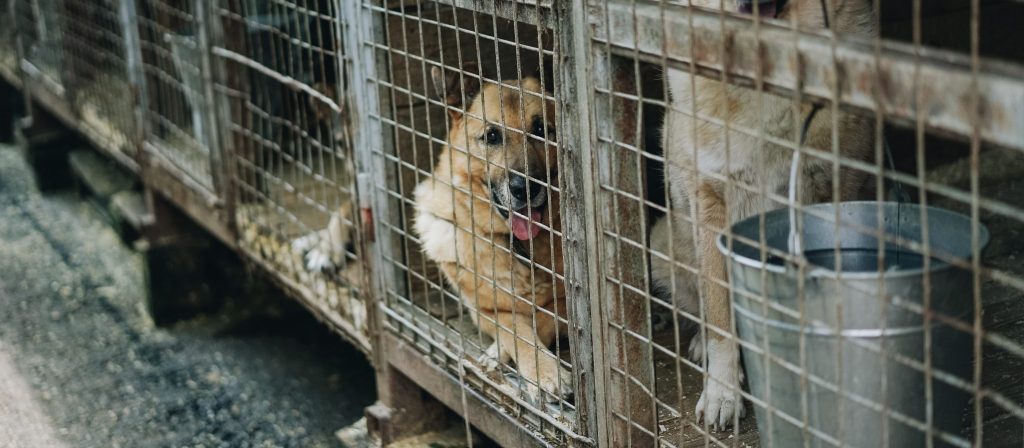
Dogs
- Asia – Dog fighting is present in various locations around Asia. Dogs are pitted against each other until one of them is declared the winner, many times the winner is declared when one of the dogs dies. Notably, China and Japan have not outlawed the practice, and despite being banned under the Taliban, dog fighting has seen a resurgence in Afghanistan. Dog fighting is particularly prominent in China and Pakistan.
- (Read more here: https://en.wikipedia.org/wiki/Dog_fighting#Asia)
- Europe – Although animal cruelty laws have been passed in some parts of Russia, dog fighting is still widely practiced in areas where it remains legal. Dog fights are still prevalent in Albania, it has been legal for over 25 years.
- (Read more here: https://en.wikipedia.org/wiki/Dog_fighting#Europe)
- Quebec, Canada – The proliferation of puppy mills in Quebec has resulted in an estimated 1500 and 1800 plants now in operation. These inhumane facilities produce the birth of approximately 400,000 puppies every year. It is unknown how many puppy mills are currently operating in Canada since these farms tend to be located in sparsely inhabited areas, and operate covertly – requiring some investigation to be uncovered.
- United States – There are an estimated 10,000 puppy mills, licensed and unlicensed, currently operating in the United States. More than 2 million puppies are bred in these mills annually.
- (Read more here: https://www.thepuppymillproject.org/about-puppy-mills)
- China – 10 million dogs are killed for their meat each year in China alone. When the dogs arrive at the dog meat markets, dehydrated, exhausted, and injured, they are often forced to watch other dogs being slaughtered.
- China – Breeding dogs spend their entire lives in cages, some so small they can’t even turn around. Those that can move are seen spinning in circles and pacing, having gone insane from the cruelty they’re subjected to. Breeding dogs in puppy mills have never known love, affection, or even what it’s like to walk on the grass.
- (Read more here: https://www.petaasia.com/features/chinese-puppy-mills)
- United States – Dog owners who haven’t properly trained their dogs and don’t know how to control their dog’s barking are resorting to “debarking” surgery. Making it physically impossible for a dog to bark, debarking surgery is needlessly cruel and strips a dog of its natural means of communication.
- United States – Greyhound dogs condemned to a life of racing spend as much as 23 hours every day locked in a tiny cage. Injuries are rife on the racetrack, and most greyhounds don’t live to see their “retirement age” of four or five years. Many dogs who do reach retirement are euthanized.
- California, United States – Greyhounds no longer useful in the racing industry are continuously bled to provide dog blood to veterinary clinics across the United States and Asia. Dogs were not permitted to socialize and spent up to 23 hours a day in tiny cages.
- (Read more here: https://investigations.peta.org/hemopet-greyhounds-expose)
- United States – Companion animals often suffer at the hands of domestic violence abusers. As many as 1 million pets per year are hurt, abused, or killed as a result of domestic violence, with more than 70 percent of women with pets who enter a domestic violence shelter reporting that their abuser had hurt or even killed a family pet.
- (Read more here: https://brandongaille.com/23-fascinating-dog-abuse-facts-and-statistics)
How To Help:
The only way to help dogs being abused is to be proactive. If you know of a dog being kept in cruel conditions or suspect a dog is being abused, it’s time to take action. If it is safe to do so, take videos or photos of the situation and then call your local animal protection organization. To help out with larger issues, start by educating family and friends about the issue. Most people are unaware of the torturous lives greyhounds live, for example, and education is the first step towards changing people’s attitudes towards the greyhound industry.
Read more about what can be done about this cruelty, and how you can help through these links:
https://www.peta.org/issues/animal-companion-issues/animal-companion-factsheets/spot-animal-abuse
https://www.humanecanada.ca/how_to_help”ecanada.ca/how_to_help
https://www.dogster.com/lifestyle/report-prevent-animal-dogs-cruelty-abuse
https://www.change.org/p/chinese-government-protection-for-dogs-in-china
https://www.telegraph.co.uk/pets/news-features/animal-cruelty-in-china-what-can-be-done-about-it
https://www.hsi.org/news-media/saving-dogs-from-chinas-dog-meat-trade/”hinas-dog-meat-trade
https://blog.mysanantonio.com/animals/2012/04/5-easy-ways-you-can-prevent-animal-cruelty
https://sentientmedia.org/animal-cruelty
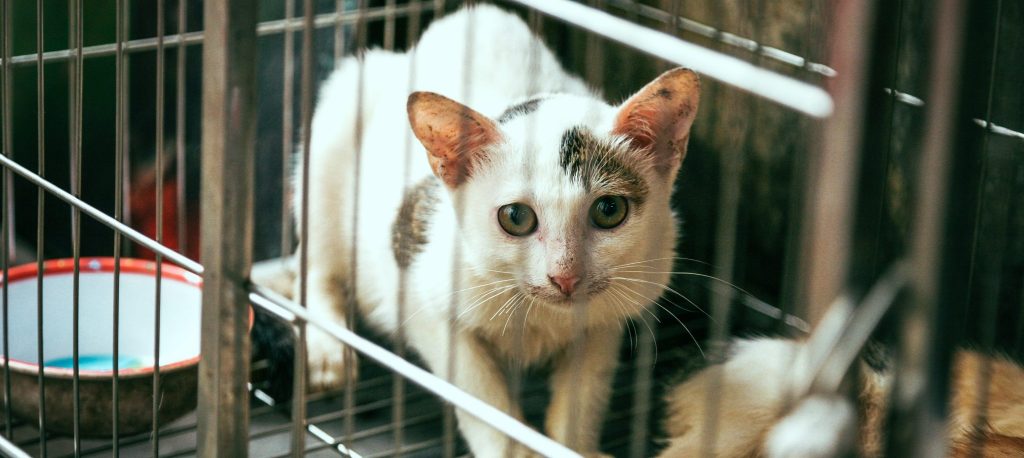
Cats
- China – 4 million cats are killed for their meat each year in China alone. Many of these cats are still wearing their collars when they are snatched from the streets and thrown into tiny cages. Both the tortuous transportation and inhumane slaughter methods in China are some of the most shocking cases of animal abuse in the world.
- Vietnam – Cat meat can be found on various menus in Vietnam, even though it is technically illegal. The cat meat market in the country is wrapped in superstition. At the start of every month, the meat is consumed to boost libido, protect against misfortune, and even increase their agility to that of a cat. The butchers want tougher meat, so they terrorize the cats before slaughtering them.
- (Read more here: [CAUTION: DISTURBING IMAGERY] https://www.thesun.co.uk/news/5818658/video-vietnam-cat-meat-market-pets-butchered)
- United States – Approximately 3.4 million cats enter animal shelters every year. Among those cats, 37% are adopted and 41% are euthanized. Out of the 3 million cats and dogs euthanized in shelters annually, 80% (2.4 million) are healthy enough to be adopted.
- (Read more here: https://kittencoalition.org/news-events/statistics)
- United States – Over 19,000 cats are abused in laboratories each year with painful, invasive, and many times deadly experiments.
How To Help:
The best way to help cats is to firstly spay or neuter your own pet cats, and then consider adopting a cat from a shelter rather than buying a kitten from a breeder. When it comes to the larger issue of cat meat in China and Vietnam, education and awareness is the first step towards change. Most people don’t know that these issues are occurring, and spreading the word and raising awareness can promote a flow-on effect of advocacy and education.
Read more about how you can help here:
https://www.peta.org/issues/animal-companion-issues/animal-companion-factsheets/spot-animal-abuse
https://www.humanecanada.ca/how_to_help
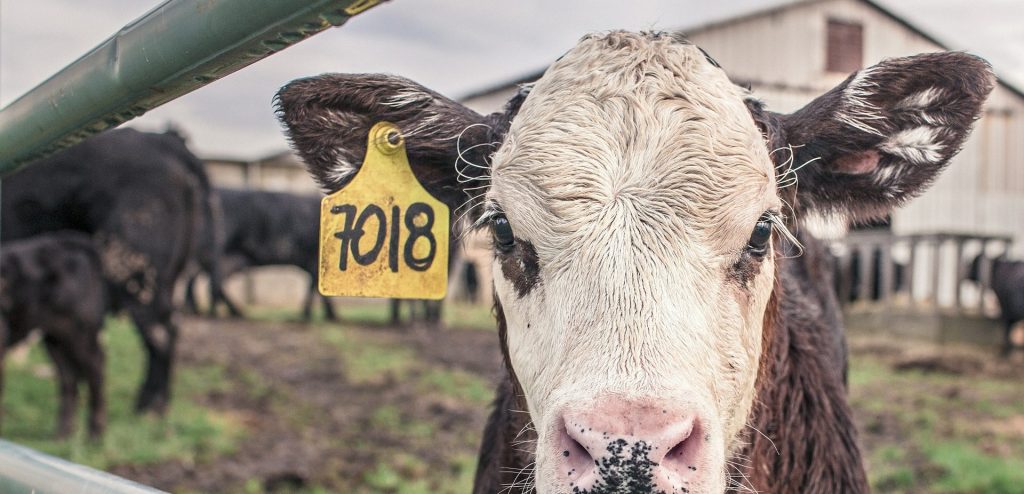
Cattle
- United States – Cattle destined for the beef industry live a life of pain and suffering from the moment they’re born. Cattle branding involves third-degree burns on a cow’s body, while horns of beef cows are burned or cut off. Inadequately protected from the weather, many cows suffer or die in extreme summer or winter conditions.
- European Union – Cows and other farm animals are repeatedly subjected to cruel living conditions before finally being slaughtered. In France, cattle raised for beef are inhumanely killed by deadly force to the back of the neck, so that abattoirs can sell cow brains without bone splinters.
- South America – Despite being denounced years ago, many South American beef abattoirs still slaughter cows by the “shackle and hoist” method, which sees cows hung upside down by hooks through the nostrils before being killed.
- New South Wales, Australia – Shocking cruelty was uncovered on a farm that supplies dairy products throughout Australia and to Vietnam. Pregnant cows are restrained as their calves are violently pulled from their wombs before being killed or immediately taken away, while cows and calves were killed by multiple blows with a hammer or multiple bullets to the head.
- (Read more here:
https://www.petaasia.com/news/cattle-killed-with-sledgehammers-vietnam and https://www.petaasia.com/action/calves-killed-with-hammers-cows-dragged-on-australian-dairy-farm)
How To Help:
There is simply no humane way of extracting cow’s milk. All dairy farms cause unnecessary ongoing suffering to cows and calves. The only way to help dairy cows and their calves is to raise awareness of the issues rife in the dairy industry and to adopt a vegan lifestyle.
Read more about how you can help here:
https://www.peta.org/issues/animal-companion-issues/animal-companion-factsheets/spot-animal-abuse
https://www.humanecanada.ca/how_to_help”ecanada.ca/how_to_help
https://www.animalsaustralia.org/issues/stop-cattle-cruelty.php
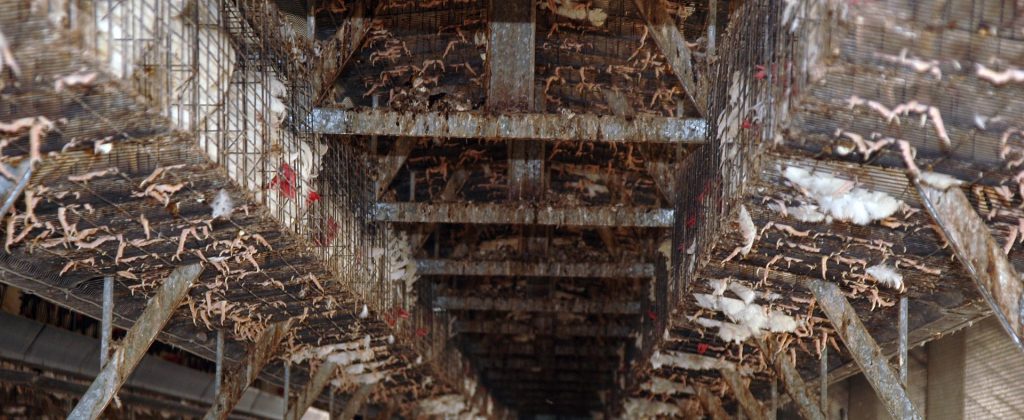
Chickens
- Canada – 729,971,245 chickens were slaughtered for meat in 2018. Chickens make up roughly 90% of land mammal slaughters in Canada.
- Worldwide – Chickens, whether bred for food or for eggs, live lives of misery from the moment they hatched. After hatching, chicks are separated by sex. Male chicks are left to suffocate in plastic bags or are ground up alive, while females have their beaks cut off with a hot blade.
- Worldwide – Broilers (chickens raised for meat) live in ridiculously cramped and filthy cages with thousands of other chickens. Fed hormones and other drugs to promote unnaturally fast growth, many chickens die from disease or skeletal problems as their bodies struggle to keep up with their unnatural rate of growth.
- (Read more here: https://www.petaasia.com/issues/food/chickens)
- United States – Chickens grown for their meat are killed at just six weeks of age. Slaughter begins by hanging the chickens upside down before running them through electrified water. However, chickens can still feel the pain when their throats are slashed. Some chickens remain alive after the throat-slashing until being submerged in boiling hot water.
- (Read more here: http://www.veganpeace.com/animal_cruelty/chicken.htm)
- Canada – If you’ve ever bought eggs or chicken meat labeled “cage-free”, “free run”, or “free-range” and thought that you were supporting a cruelty-free industry, think again. In Canada, no chickens are kept in cages, which legally allows producers to use these deceptive terms. However, chickens are still kept indoors in filthy and highly cramped conditions – no better than if they were in cages
How To Help:
With arrays for eggs or meat, chickens are widely thought to be the world’s most abused animals. Society is turning away from red meat, causing demand for white chicken meat to continually increase. To play your part in helping shut down the inhumane egg and chicken industry forever, choose a vegan lifestyle.
Read more about how you can help:
https://www.peta.org/issues/animal-companion-issues/animal-companion-factsheets/spot-animal-abuse
https://www.humanecanada.ca/how_to_help”ecanada.ca/how_to_help
https://www.change.org/p/stop-the-cruelty-towards-chickens
https://www.vox.com/the-big-idea/2017/6/19/15827828/factory-farming-switchetarian-beef-chicken
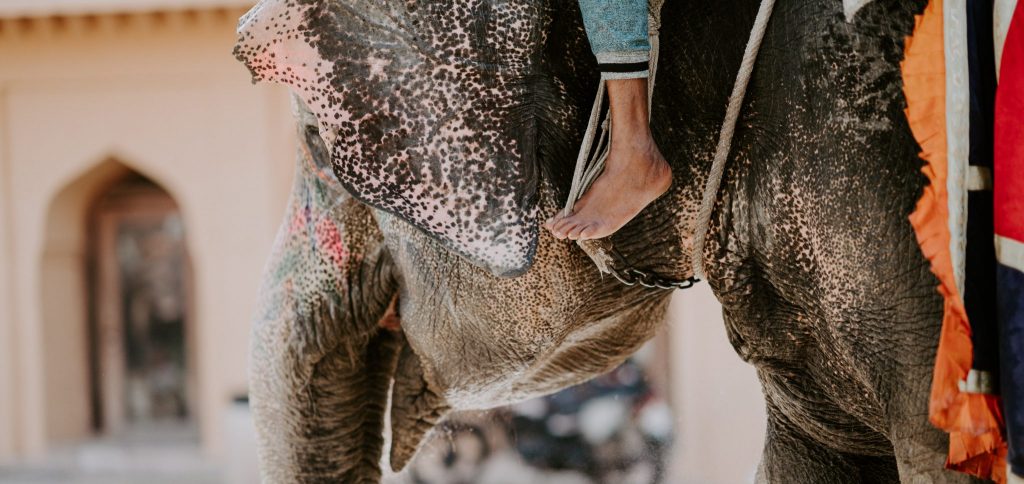
Elephants
- Asia – Elephants are often kept as attractions in small zoos or even as pets, in inappropriate environments with nowhere near enough room to move around. Naturally sociable animals, elephants kept in captivity in Asia are housed alone.
- United States – Despite public pressure, some circuses still use elephants as part of their act. “Broken” from a very young age, elephants are whipped, shocked, beaten, and forced to stay standing for hours at a time so they can learn “tricks” to please the audience.
- Thailand – as many as 4,000 wild elephants are still being kept as captive slaves in Thailand. Forced to entertain, give rides, haul heavy loads, or even beg in the streets, Thailand’s elephants have been captured from the wild and had their spirits broken through violence and fear.
- (Read more here: https://www.petaasia.com/issues/entertainment/elephants)
- Asia – Of the almost 3000 elephants kept in captivity throughout Asia to entertain tourists and provide rides, more than three-quarters of them live in appallingly cool conditions. When not performing, elephants are often trained up on concrete floors with less than three meters to move.
- Southeast Asia – Despite what tourist attractions will tell you, elephants used for rides and entertainment in Southeast Asia have not been rescued and do not live peaceful lives. Breeding in captivity is extraordinarily difficult, with no captive element being bred in Vietnam in the last four decades. Elephants used in Southeast Asia have been stolen directly from the wild.
- Sri Lanka – A 70-year-old elephant called Tikiri was dressed in a costume to hide her skeletal body, still forced to perform and walk in endless parades. Her eventual death was the only source of relief this elderly elephant had ever known in her life.
- (Read more here: https://www.petaasia.com/news/captive-elephant-incidents)
- Nepal – Elephants are routinely beaten, stabbed with hooks, and have their ears violently pulled to force them to pretend to “play games” for the amusement of tourists and festival onlookers.
- (Read more here: https://secure.petaasia.com/page/43135/action/1)
- Botswana – Heavily armed elephant poachers are slaughtering elephants en masse following the dismantling of the anti-poaching unit in Botswana.
How To Help:
Under no circumstances should elephants be used to entertain, carry loads, or provide rides. While most circuses have succumbed to pressure and no longer use elephants, there are still some that do. If you hear of a circus coming to town with elephants, contact your nearest animal protection organization. When overseas, never visit an attraction or participate in elephant rides or entertainment, and never like or share photos of others who do so.
Read more about how you can help here:
https://www.peta.org/action/can-help-stop-elephant-abuse
https://www.peta.org/issues/animal-companion-issues/animal-companion-factsheets/spot-animal-abuse
https://www.humanecanada.ca/how_to_help”ecanada.ca/how_to_help
https://www.stopcircussuffering.com

Horses
- United States – Many Horses still suffer from “soring” in the walking horse industry.
- (Learn about “soring” here: https://www.humanesociety.org/resources/what-soring)
- (Learn about The PAST Act here: https://www.humanesociety.org/news/house-reintroduction-past-act-brings-relief-chronically-abused-horses-one-step-closer)
- United States – Horse racing causes 24 fatal “breakdowns” every week. Between 2009-2011, around 3,600 horses died during races.
- (These stats don’t include horses killed before they make it to races. Read more here: https://www.peta.org/issues/animals-in-entertainment/horse-racing-2)
- United States – “The Thoroughbred-racing industry sends an estimated 10,000 horses to slaughter annually… half of the 20,000 new foals born each year will eventually be killed for their flesh.
- Worldwide – Horse races occur all over the world. Some of the most popular horse races are hosted in Australia, the US, England, United Arab Emirates, France, and Japan.
- (You can find a list of horse events around the world here: https://en.wikipedia.org/wiki/List_of_horse_races)
- Worldwide – Both legal and illegal performance-enhancing drugs are used to mask pain, allowing horses to race and train with injuries that would otherwise be too painful to run on. The widespread use of non-therapeutic drugs is a leading cause of injury and fatal breakdown on racetracks.
- (Read more about drug use in horse racing here: https://www.peta.org/issues/animals-in-entertainment/horse-racing-2/horse-racing-industry-cruelty/drugs)
- Canada and Mexico – In 2015, a stunning 130,000 American horses were slaughtered in Canada and Mexico. Breeders, along with racing, show, and rodeo industries continue to churn out hundreds of thousands of horses each year.
How To Help:
If you know of or see cruelty to horses in any way, be proactive and stand up for animals who don’t have a voice of their own. Take videos and photos if safe to do so, and immediately contact your local animal protection organization. Choose to boycott horse race events, and share information to educate others about the cruelty involved in the horseracing industry.
Read more about how you can help:
https://cowgirlmagazine.com/stop-horse-abuse
http://horserescueutah.org/how-to-spot-and-prevent-horse-abuse
https://www.peta.org/issues/animal-companion-issues/animal-companion-factsheets/spot-animal-abuse
https://www.humanecanada.ca/how_to_help”ecanada.ca/how_to_help
https://www.change.org/p/stop-horse-abuse
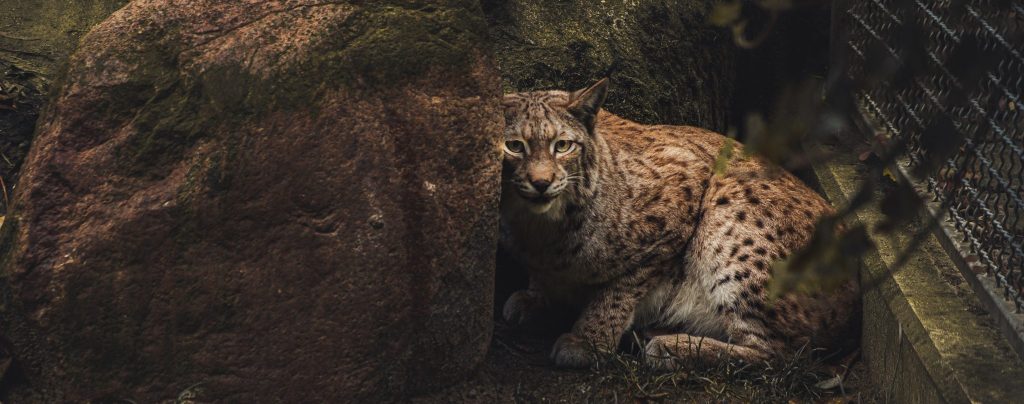
Big Cats
- China and South Africa – “Canned hunting” is a highly secretive and hidden – yet very lucrative – industry. Big cats, particularly lions, are kept in small enclosures where they can be “hunted” by wealthy hunters who pay tens of thousands of dollars for the experience. The animal’s head is kept by the hunter as a trophy, while the rest of the body is sold to practitioners of Chinese medicine.
- United States – Many circuses still feature big cats, forcing these wild, nocturnal, solitary, and water-loving animals to live in cramped quarters with other animals, never having access to a watering hole. Mothers and cubs are routinely separated long before the maternal bond would have been broken in the wild.
- (Read more here: https://www.peta.org/features/big-cats-lions-tigers-circus)
- South Africa – 27 lions kept at a lion breeding facility in South Africa have been diagnosed with mange, with their cases being so severe that the Lions had lost their fur.
- Thailand – A new tiger entertainment has recently opened, despite ongoing pressure for Thailand to reduce its reliance on tiger entertainment venues. Thailand’s wild tiger population has dropped to around 250, with four times this amount still being camped captive in entertainment venues.
- Worldwide – Tigers are inherently afraid of fire, yet tigers in captivity are frequently forced to jump through metal hoops alight with fire. In order to push past their instinctive terror of fire, tigers are punished for non-compliance to the point where it is preferable for them to face fire than to endure further punishment.
- (Read more here: https://www.peta.org/features/big-cats-lions-tigers-circus)
- Worldwide – Animal agriculture is a greater contributor to global warming than all worldwide transportation systems put together. When fish are killed for food, enormous ships are at sea for six months at a time, resulting in the elimination of 90% of fish populations, with many other marine animals and birds killed or injured as a result.
How To Help:
If you hear of a circus coming to town that features big cats, contact an animal protection organization and boycott the show, encouraging others to do so as well. Never support anyone who hunts big cats or who displays hands or skins as trophies. When traveling, avoid tourist attractions that feature wild animals. Remember that these animals have been forced into submission through fear and violence.
Read more about how you can help here:
https://www.stopcircussuffering.com
https://www.peta.org/issues/animal-companion-issues/animal-companion-factsheets/spot-animal-abuse
https://www.humanecanada.ca/how_to_help”ecanada.ca/how_to_help
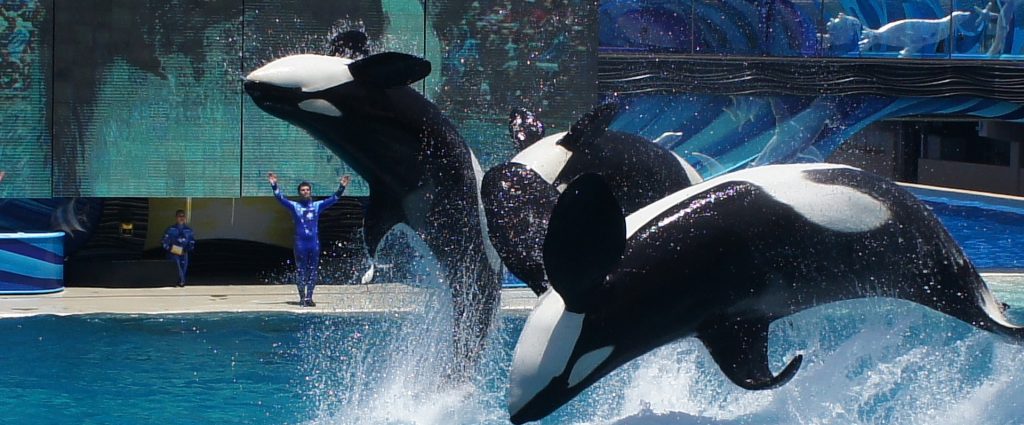
Marine Animals
- Worldwide – Marine themed entertainment parks like SeaWorld, purport to be places of research and education, yet they are no better than zoos. Part of a multibillion-dollar industry, these theme parks and aquariums force intelligent marine animals to perform and spend their lives in captivity.
- Worldwide – Marine animals share strong social bonds within families, just like humans. Marine themed entertainment parks and aquariums destroy familiar bonds, ripping dolphins and orcas – who would normally stay with their family groups for life – away from the normal social networks, forcing them to live solitary lives of confinement.
- (Read more here: https://www.petaasia.com/issues/entertainment/marine-parks)
- Philippines – Ocean litter has caused the death of yet another enormous marine animal, with a juvenile whale found dead on the shores of the Philippines having ingested more 40 kilograms of plastic rubbish and other waste.
- Choshi, Japan – A dolphin, 46 penguins, and other marine animals and fish have been abandoned following the closure of a marine-themed aquarium in Choshi, Japan. The marine animals were abandoned after the park was closed, with no arrangements made for their safe transfer to a marine animal sanctuary.
- (Read more here: https://secure.petaasia.com/page/29765/action/1)
- Canada – Every year sees Canada play host to a shameful practice, the annual bludgeoning of baby harp seals, most under three months of age. By repeatedly shooting and clubbing baby seals, hunters kill thousands of babies every year in a practice that not only condoned but celebrated by the Canadian government.
- (Read more here: https://www.petaasia.com/news/5-easy-ways-help-animals-world-oceans-day)
- Worldwide – If asked to guess which creature is the most dangerous predator in the world, most people would point the finger squarely at sharks. However, humans far outweigh sharks or any other creature when it comes to massacres and meat consumption. To compare, note that humans kill at least 100 billion sharks every year, in addition to the billions of other sea creatures and land animals. Meanwhile, sharks kill on average 10 humans every year. Who’s the biggest predator now?
- (Read more here: https://www.peta.org/features/sharks)
- Worldwide – Shark fin soup is considered a delicious meal for some, but it means painful suffocation and eventual death for millions of sharks around the world every year. Sharks are caught and dragged to the surface of the water, where their fins are brutally cut off. Since the rest of the shark’s body is not wanted, they are tossed back into the water to die a slow and painful death, usually from suffocation.
- (Read more here: https://www.peta.org/blog/shark-fishing-banned-bahamas)
- United States – SeaWorld is known for inflicting pain and suffering on its captive marine wildlife, but perhaps not so bad as its treatment of penguins. Endlessly paraded around as props and entertainment, penguins know no safety at SeaWorld. Repeatedly having to undergo surgery to have rubbish removed from their stomachs from the inhumane and dirty enclosure they swim in, penguins live lives of misery from the moment are stolen from her mothers to their eventual deaths in captivity.
- Iceland – Despite international pressure and low demand, an Icelandic company Hvalur hf (Whale Inc.) continues to slaughter fin whales. Even though these whales are an endangered species, the CEO of the company describes them as an “abundant marine resource” and “just another fish for me”. Enormously large, fin whales are killed by being impaled with a harpoon fired from a cannon.
- (Read more here: https://www.peta.org/blog/iceland-hvalur-fin-whale-hunt)
- Indonesia – A sperm whale has washed up on Indonesian shores having ingested 13 pounds of plastic streaming and plastic rubbish, including cups, bottles, bags, and even shoes.
- (Read more here: https://www.peta.org/blog/dead-whale-ingested-plastic-bags-bottles-cups)
- Canada – Despite international pressure and many countries banning the importation of seal fur, the Canadian government continues to support and condone annual baby seal clubbing. Many Canadians no longer wish this practice to continue, yet the Canadian government has yet to ban the cruel and unnecessary practice.
- (Read more here: https://support.peta.org/page/1144/action/1?locale=en-US)
- Namibia – Starting on 1 July every year, an estimated 85,000 fur seal pups are murdered by brutal beatings and stabbing for their pelts, while another 6,000 male adult seal will be killed for their genitals to be harvested to make aphrodisiac for sale throughout Asia.
- (Read more here: https://www.petaasia.com/news/stop-the-slaughter-of-the-seals-of-nam)
How To Help:
The first thing that must be done to help marine animals is to stop the multibillion-dollar marine themed entertainment industry. By boycotting aquariums and theme parks like SeaWorld, and educating others to do the same, you can vote with your feet and your wallet and tell these giant corporations that they can no longer profit from abusing marine animals. More generally, promise to never visit or support any organization that makes money from live animals. Rethink everything you thought you knew about humans’ “need” to eat fish to survive. All nutrients found in fish can be easily sourced from plant-based products. By choosing a vegan lifestyle, you can reduce international fishing and save the lives of countless fish and other marine animals around the world.
Read more about how you can help here:
https://www.petaasia.com/news/5-easy-ways-help-animals-world-oceans-day
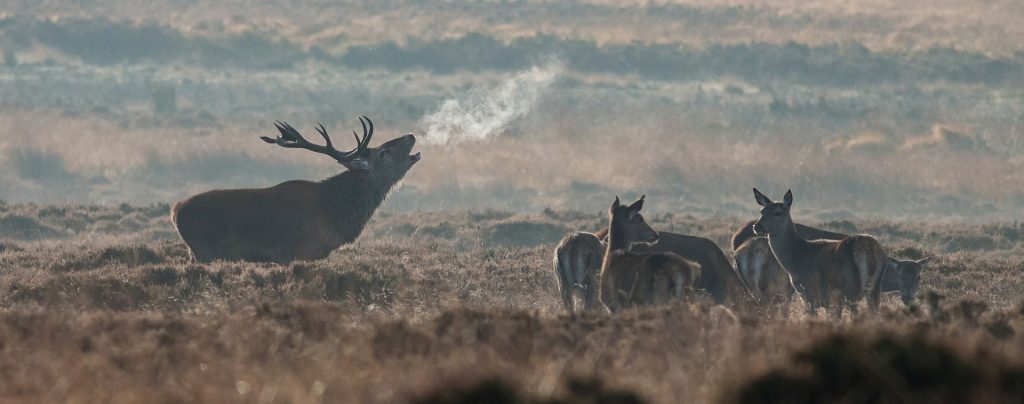
Land Mammals
- Canada – 627,303 deer, elk, bison, wild boars, and rabbits were slaughtered by the canadian meat industry in 2017
- China – Traditional Chinese medicine sees bear bile as a valuable resource. It is this belief that has countless bears imprisoned in tiny cages, constantly having bile extracted from their gallbladders. Imprisoned for their entire lives, bears often self-harm or go insane from their lives of cruelty. When they are no longer able to produce bile, they are left to starve.
- Germany – A German laboratory has come under investigation following reports and footage showing macaque monkeys being violently handled, beaten, grabbed with metal tongs, and restrained with braces during medical testing
- Worldwide – Hunting is considered a sport and fun pastime for people around the world, but at what cost? It is estimated that half of all animals shot with a crossbow are injured but do not die, causing these animals to live lives of pain and suffering, many of whom go on to die of starvation, too weak to find their own food.
- United States – Canned hunting, where animals are kept on private reserves and rich hunters pay tens of thousands of dollars for the “thrill” of hunting their own animal and keeping its head as a trophy, is rife throughout the United States as it is in other parts of the world. Ted Turner owns more 2 million acres of land throughout the United States and accepts tens of thousands of dollars from hunters to kill turkeys, antelopes, deer, and bison on his private land. With a policy of “no kill, no pay”, you can be sure that each hunter gets what they came for when they visit a canned hunting ranch.
How To Help:
It’s time to stop thinking of hunting as a sport and start recognizing it for what it is: a killing spree disguised as an acceptable pastime. How can hunting be considered a sport, when sports include a referee or judge, consenting parties, and never end with a deliberate death. Show your disdain for the cruelty of hunting by never liking or sharing a photo of hunting, and educating others about the realities of this cruel practice.
Read more about how you can help:
www.peta.org/issues/animals-in-entertainment/cruel-sports/hunting
www.onegreenplanet.org/animalsandnature/10-simple-ways-you-can-help-stop-wildlife-poaching-today
Want us to add something to the list? Let us know on Facebook or Twitter!
—————————————–
SOURCES:
- www.animaljustice.ca
- www.peta.org
- www.wikipedia.org
- www.humanesociety.org
- www.spacanada.org
- www.animalsasia.org
- Kittencoalition.org
- www.thesun.co.uk
- www.onegreenplanet.org
- Aldf.org
- www.theguardian.com
- www.petaasia.com
- www.seaworldofhurt.com
- www.humanecanada.ca
- www.stopcircussuffering.com
- www.worldanimalprotection.ca
- www.change.org
- Cowgirlmagazine.com
- www.worldanimalprotection.ca
- www.nationalgeographic.com
- www.vox.com
- Spca.bc.ca
- www.veganpeace.com
- www.animalsaustralia.org
- www.jpost.com
- www.spacanada.org
- www.thepuppymillproject.org
- Brandongaille.com
- www.dogster.com
- www.telegraph.co.uk
- www.hsi.org
- mysanantonio.com
- sentientmedia.org
- www.thesun.co.uk

Leaders of Animal Protection Efforts Around The World
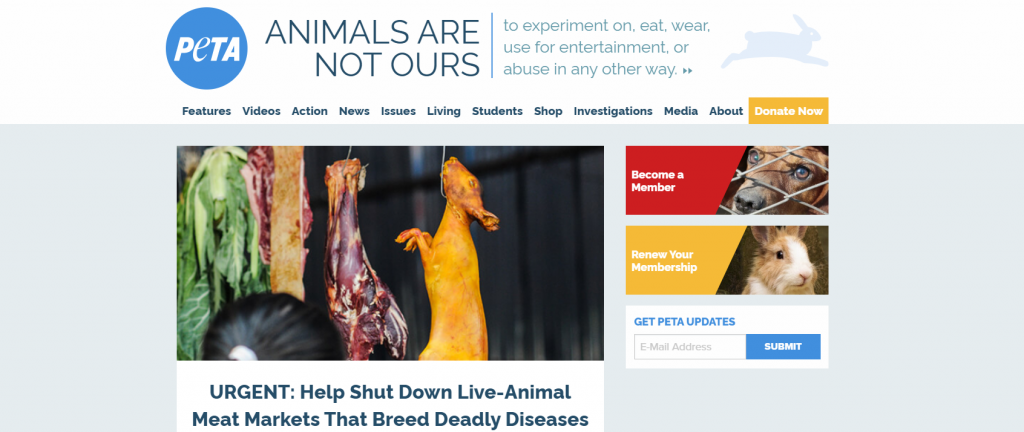
PETA (People for the Ethical Treatment of Animals)
Headquartered in the United States but with offices in countries all over the world, PETA is the world’s largest animal rights organization. With more than 6.5 million supporters around the globe, PETA plays an enormous role in animal advocacy, education, protests, campaigning for legislative reform, and on-the-ground rescues.
There are numerous ways – both financial and non-financial – to support PETA’s efforts. Find out more here. https://www.peta.org/donate/ways-to-support-peta/
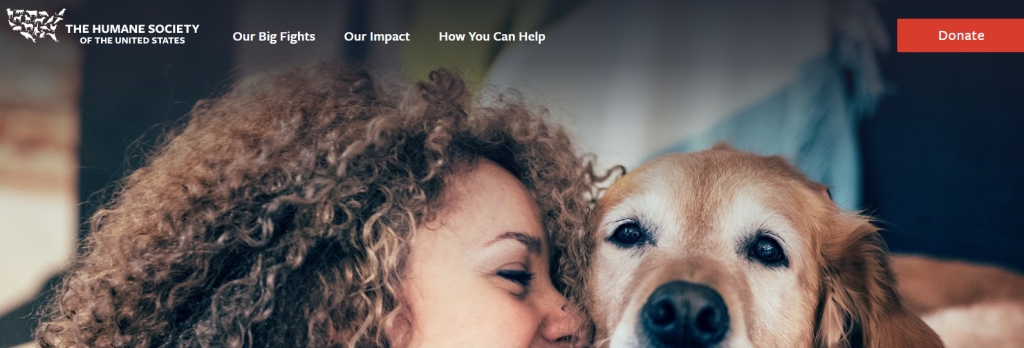
The Humane Society
Based in the United States, the Humane Society aims to put an end to animal cruelty in all its forms. There are many ways to support the Humane Society, including financially, by volunteering, by helping with advocacy, or even by donating unwanted vehicles. Find out more here. https://www.humanesociety.org/how-you-can-help
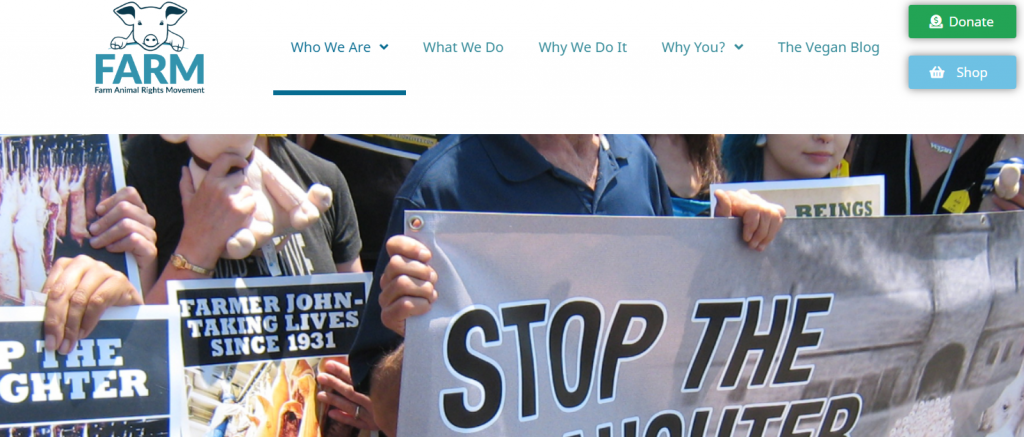
FARM (Farm Animal Rights Movement)
With a specific focus on farm animals and founded back in 1981, FARM was the first-ever United States base animal-rights organization. With a strong push towards paganism and the end of animal farming, FARM runs public awareness campaigns and aims to train the next generation of activists while working to end animal farming forever.
Donate to FARM or shop at their online store here. https://farmusa.org/whyyou
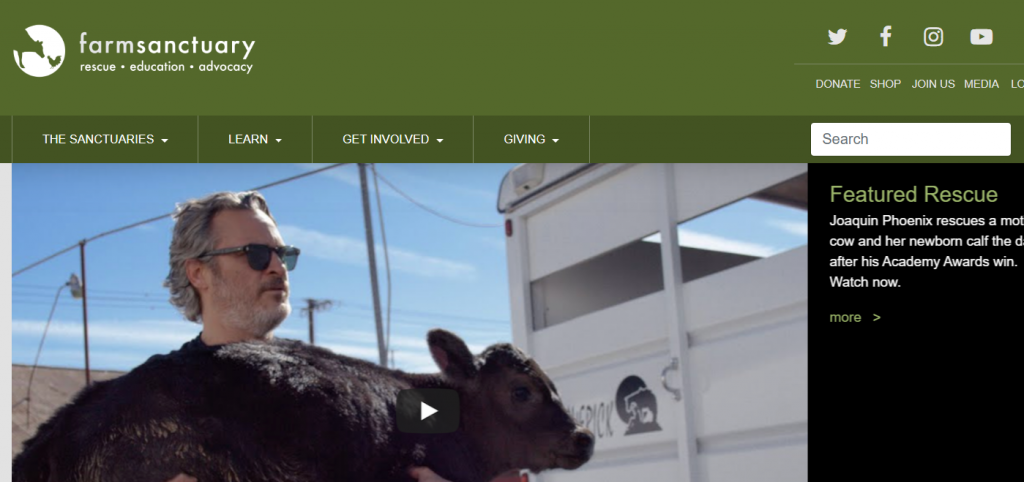
Farm Sanctuary
This United States-based animal welfare organization creates and runs physical sanctuaries to rescue and care for factory farm animals, while also advocating for law and policy reform and educating people on the plight of animals forced to live short, painful lives on factory farms. Farm Sanctuary accepts financial support and also runs a sponsorship program for rescued farm animals living in one of their sanctuaries.
Find out the various ways you can help here. https://www.farmsanctuary.org/giving/more-opportunities/
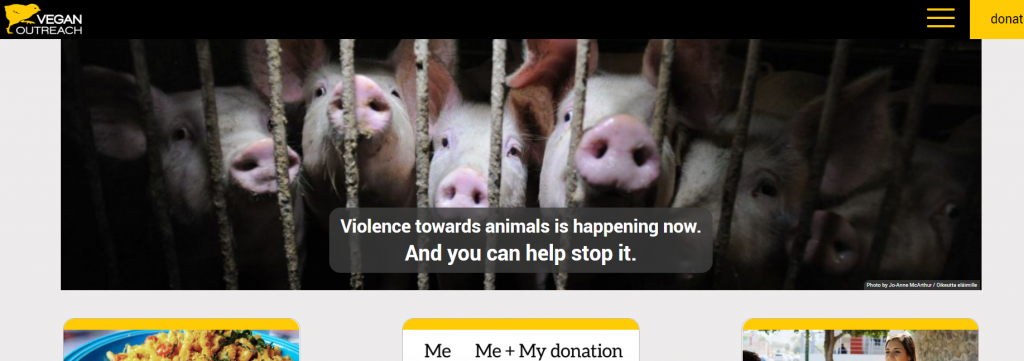
Vegan Outreach
Base in the United States but with several international offices – most notably one in India – Vegan Outreach is a vegan advocacy organization that hosts challenges and guided plans to help everyday people transition to a plant-based diet.
Donate to Vegan Outreach here. https://veganoutreach.org/donate/
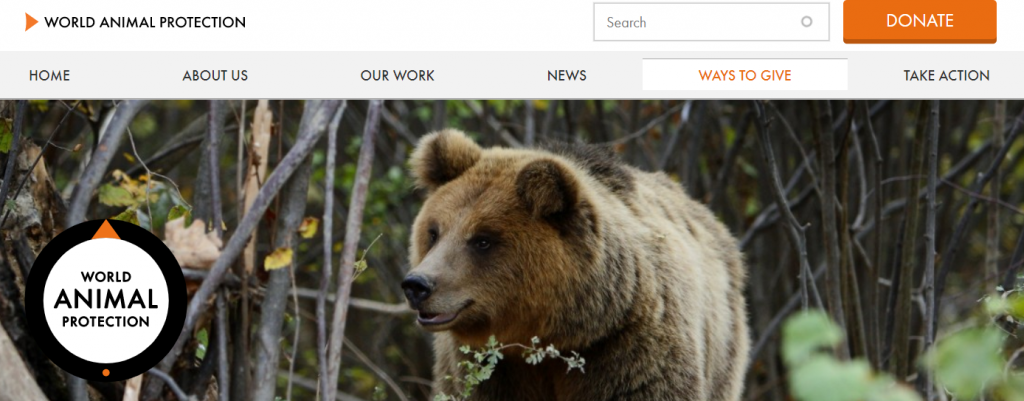
WSPA (World Society for the Protection of Animals)
Headquartered in Canada, WSPA provides advocacy and education services on animal protection and shines a light on animal cruelty in zoos, farms, aquariums, and factory farming. With a strong emphasis on advocating for legislative reform, WSPA tackles some of the biggest animal-rights issues throughout Canada.
Find out all the ways you can support WSPA here. https://www.worldanimalprotection.ca/ways-give
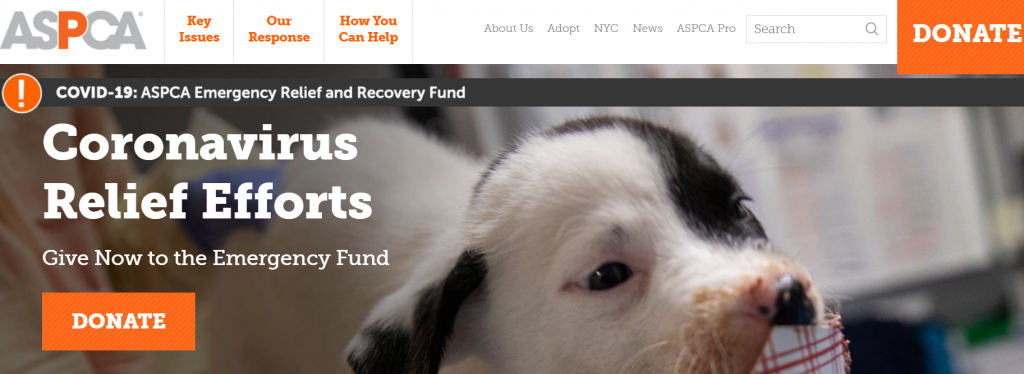
ASPCA (American Society for the Prevention of Cruelty to Animals)
ASPCA was the first animal-rights organization founded in the United States and remains one of the world’s largest. With more than 2 million members and supporters throughout the United States, ASPCA focuses its efforts on legislative reform and campaigning for anti-cruelty measures to be inserted into existing laws and policies. The organization also has a strong presence in animal rescue and placement efforts.
Donate to the ASPCA here. https://secure.aspca.org/donate/donate
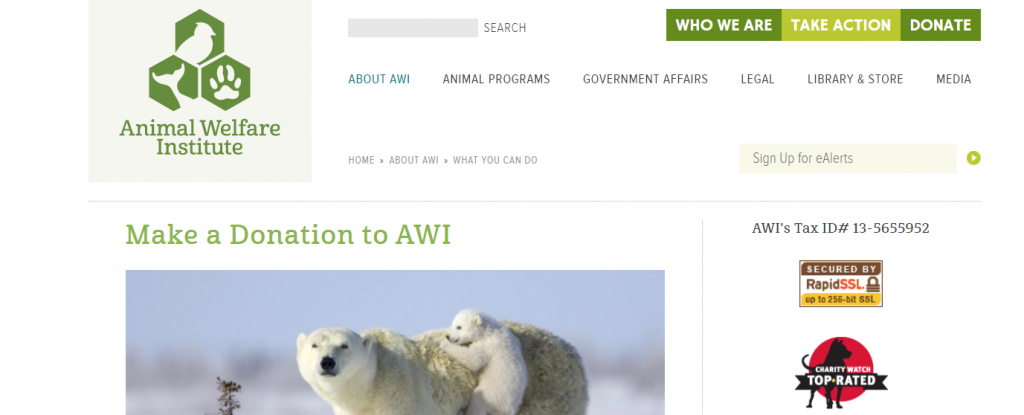
Animal Welfare Institute
Founded in the United States back in 1951, the Animal Welfare Institute has a particular focus on animals used in laboratories for testing and experiments. With a separate division that deals with legislative reform, the Animal Welfare Institute continues to advocate for product and medical testing that does not involve the use of animals.
find out how to donate to the Animal Welfare Institute here. https://awionline.org/content/make-donation-awi
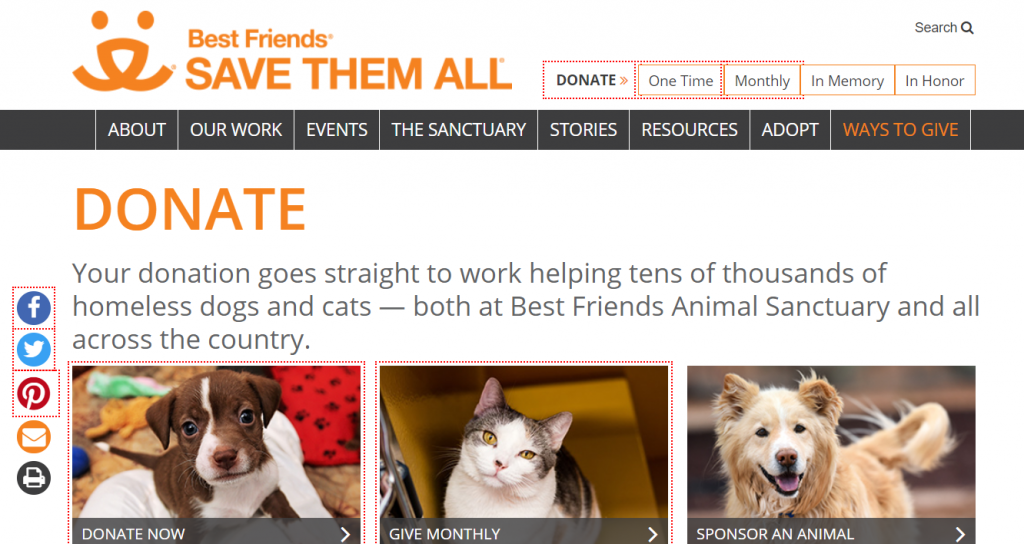
Best Friends Animal Society
Headquartered in Utah in the United States, the Best Friends Animal Society largely focuses its education and advocacy efforts on pet rescue and adoption, with a push to spay and neuter all domestic animals. Its bimonthly magazine has more than 200,000 subscribers, bolstered by the organization’s presence following Hurricane Katrina and its unrelenting efforts to provide animal rescue services in affected areas.
Find out the various ways you can support the Best Friends Animal Society here, including with financial donations or animal adoption. https://bestfriends.org/donate
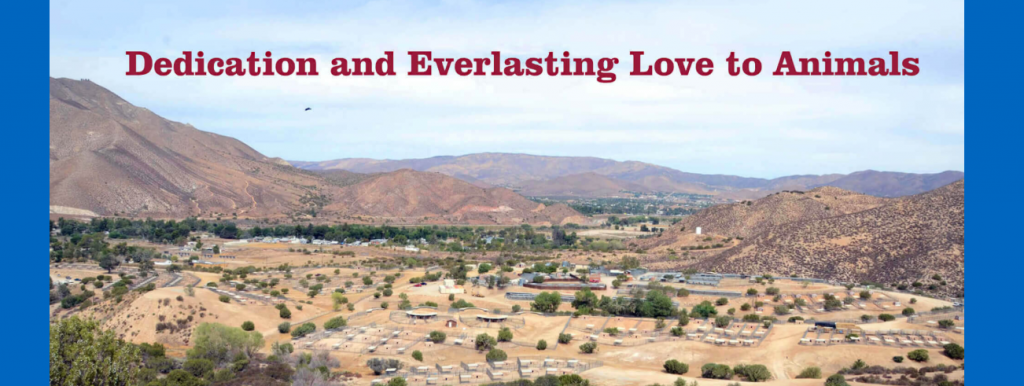
D.E.L.T.A. Rescue
Based in California in the United States, D.E.L.T.A. Rescue was the first and remains one of the only organizations to rescue animals that have been abandoned or born in the wilderness. D.E.L.T.A. Rescue has two hospitals and sanctuaries spanning more than 150 acres, making it one of the largest no-kill sanctuaries that promise to care for its rescued animals for the remainder of their lives. D.E.L.T.A. Rescue remains committed to the longevity and safety of its rescued animals and does not offer animal adoption. However, financial supporters can come on a tour of one of the sanctuaries to see the organization’s efforts firsthand.
Find out how to support D.E.L.T.A. Rescue here. https://www.deltarescue.org/make-donation-help-animals/
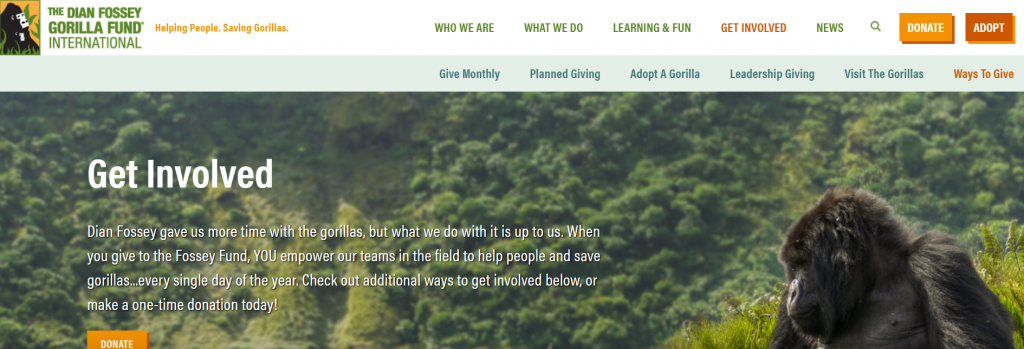
The Dian Fossey Gorilla Fund International
Headquartered in the United States but with teams on the ground in the Congo and Rwanda, the Dian Fossey Gorilla Fund International is solely focused on the study and protection of gorillas and gorilla habitats in Africa, with particular emphasis on Rwanda. The organization employs trackers to continuously monitor and protect gorillas in their natural habitat as part of their Karisoke Research Center, while advocates and supporters bravely destroy poachers’ traps and continue to advocate for the rights of gorillas and to stop poaching forever.
There are various ways to support the Dian Fossey Gorilla Fund International, including financial donations and symbolic gorilla adoption. Find out more here. https://gorillafund.org/get-involved/
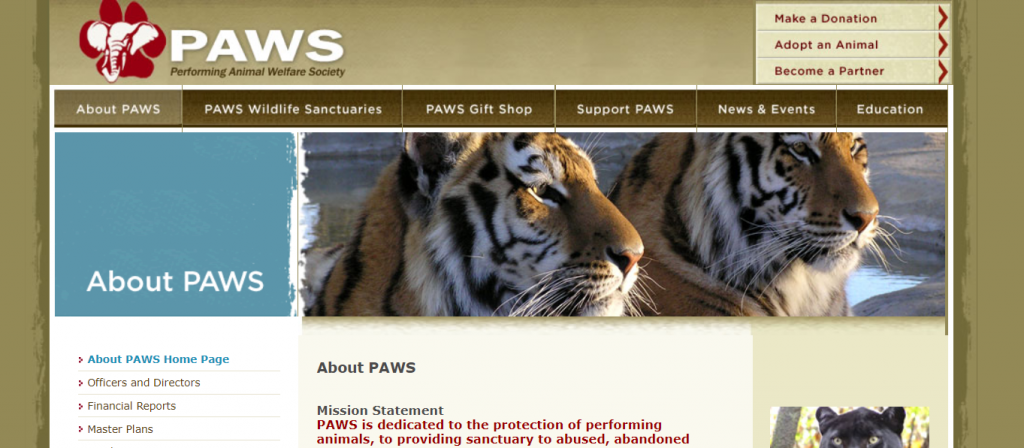
PAWS (Performing Animal Welfare Society)
PAWS operates wildlife sanctuaries to care for abused, abandoned, or retired performing animals in the United States. When a wild animal has been cruelly imprisoned and forced to entertain for years or even decades, they deserve to live out the rest of their years in a peaceful natural habitat where they are not being controlled or forced to perform in any way. PAWS provides such sanctuaries for former performing animals and also rescues animals from the exotic animal trade.
Find out how to support PAWS here. https://www.pawsweb.org/support_paws_home_page.html
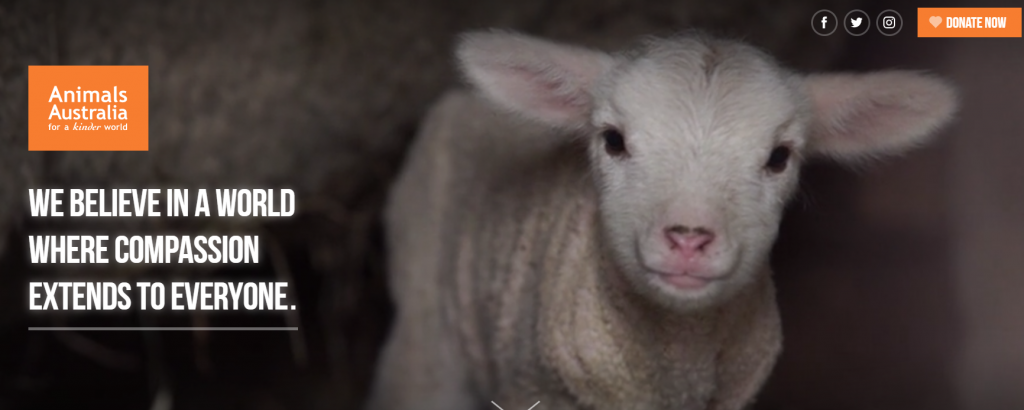
Animals Australia
One of the largest and most prolific animal-rights organizations in Australia, Animals Australia promotes and supports veganism, the end of live animal export, and animal protection and anti-cruelty efforts across the country. In recent years, Animals Australia has been focused on undertaking risky undercover investigations and exposing widespread animal cruelty through television exposes and advertisements.
There are various ways to support Animals Australia, including becoming a financial member, joining in their advocacy efforts, or shopping in their cruelty-free online store. https://secure.animalsaustralia.org/donate/

Protection Effort Facts:
Veganism
Worldwide – estimated 100 lives saved per year by living a vegan lifestyle
Cats and Dogs
United States – Humane Society spayed, neutered, and provided for 175,000 companion animals in poverty-stricken areas in 2018
Puerto Rico – Humane Society spayed and neutered 85,000 dogs and cats in 2018
China – Humane Society International rescues 1,000 dogs and cats from trucks bought for slaughter
United States – ASPCA – 1.6 million cats and 1.6 million dogs are adopted from shelters each year
United States – The Beagle Freedom Project aims to rescue the 65000 beagles used in lab testing every year
Pennsylvania – Beagle Rescue League rehomes 350 beagles from lab testing since 2005
Bees
United States – Over 1 million gardens registered with National Pollinator Garden Network to provide bee friendly plants
Netherlands – 316 bus stops covered with plants to support bee colonies
Chimpanzees
Louisiana – Chimp Haven rescues 300 chimpanzees from labs since 1995
Stellar Sea Lion
United States – National Oceanic and Atmospheric Administration brought population from 18,000 in 1979 to 70,000 in 2010
Grey Wolf
Wisconsin and Minnesota – population brought from 300 in 1960 to 5,443 in 2013
Rabbits
California – Bunny Bunch Rabbit Rescue rescues over 10,000 rabbits from lab testing since 1984
Rodents
California – New Life Animal Sanctuary rescued 300 rodents from a university lab
Elephants
Kenya – The David Sheldrick Wildlife Trust has hand raised 150 orphaned baby elephants
Giraffes
Africa – United Nations provides protection for 100,000 remaining wild giraffes against international trade
Tigers
Nepal – World Wildlife Fund – tiger population doubled from 2009
Thailand – Huai Kha Khaeng (HKK) Wildlife Sanctuary increased tiger population from 41 in 2010 to 66 in 2019
Tortoise
Myanmar – Turtle Survival Alliance rescued 175 tortoises in the mid-1990s and now have a population of over 14,000
Resources
- https://www.elephantand.co/blogs/blog/world-wide-elephant-charities
- https://www.humanesociety.org/spayathon
- https://www.goodnewsnetwork.org/giraffes-given-international-protection-at-cites/
- https://www.goodnewsnetwork.org/5-ways-people-are-helping-bees-national-honeybee-day/
- https://www.worldwildlife.org/stories/nepal-nearly-doubles-its-wild-tiger-population
- https://www.aspca.org/animal-homelessness/shelter-intake-and-surrender/pet-statistics
- https://www.treehugger.com/conservation/9-iconic-animals-recovering.html
- https://www.iflscience.com/plants-and-animals/7-animals-saved-near-extinction/
- https://www.huffingtonpost.com.au/2017/06/21/chinese-activists-save-1000-dogs-and-cats-from-being-killed-and_a_22534847/
- https://www.peta.org.au/news/how-many-animals-saved-vegan-2016/
- https://turtlesurvival.org/
- https://www.thainationalparks.com/huai-kha-khaeng-wildlife-sanctuary
- https://www.worldwildlife.org/
- https://www.un.org/en/
- https://www.sheldrickwildlifetrust.org/
- https://newlifeanimalsanctuary.org/
- https://www.bunnybunch.org/
- https://www.noaa.gov/
- https://chimphaven.org/
- http://millionpollinatorgardens.org/
- https://beaglerescueleague.org/
- https://bfp.org/
If you’d like to learn more about animal protection efforts, or would like to get involved, please visit the websites of the animal protection leaders we’ve listed above.
Share this page:

 Worldwide
Worldwide